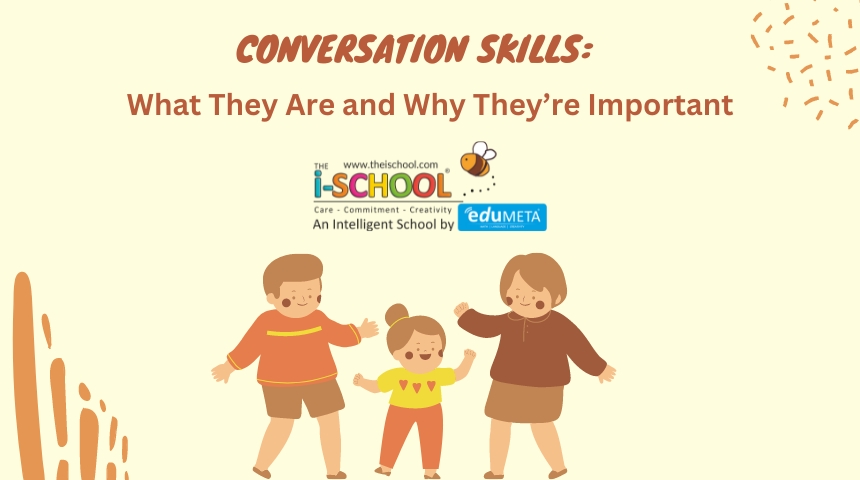Conversation Skills: What They Are and Why They’re Important

Conversation skills are fundamental to effective communication and play a critical role in personal and professional interactions. These skills encompass various abilities that help individuals engage in meaningful exchanges, understand others, and express their thoughts clearly. At eduMETA THE i-SCHOOL, we recognize the importance of nurturing strong conversation skills from an early age to prepare children for successful interactions throughout their lives.
What Are Conversation Skills?
Conversation skills refer to a set of abilities that enable individuals to engage in productive and enjoyable conversations. These skills include:
1. Active Listening:
- The ability to fully concentrate on, understand, respond to, and remember what is being said. Active listening involves paying attention without interrupting and providing feedback to the speaker.
2. Effective Speaking:
- Clear and articulate expression of thoughts and ideas. Effective speaking includes using appropriate language, tone, and body language to convey messages accurately.
3. Non-Verbal Communication:
- Using body language, facial expressions, and gestures to support and enhance verbal communication. Non-verbal cues can provide additional context and meaning to spoken words.
4. Turn-Taking:
- The ability to alternate speaking roles in a conversation smoothly. Turn-taking ensures that all participants have a chance to contribute and keeps the conversation flowing naturally.
5. Empathy and Understanding:
- Recognizing and respecting the emotions and perspectives of others. Empathy helps in building connections and responding appropriately to the feelings of others.
6. Questioning and Clarification:
- Asking relevant questions to gain more information and clarify points. Effective questioning helps in exploring topics more deeply and ensuring understanding.
7. Responding Appropriately:
- Providing relevant and thoughtful responses based on the context of the conversation. Appropriate responses contribute to meaningful dialogue and keep the conversation engaging.
8. Maintaining Conversation Flow:
- Keeping the conversation dynamic and interesting by introducing new topics, making transitions smoothly, and addressing any pauses or awkward moments.
Why Are Conversation Skills Important?
1. Building Relationships:
- Strong conversation skills help in forming and maintaining personal and professional relationships. Effective communication fosters trust, understanding, and connection between individuals.
2. Enhancing Social Interactions:
- Good conversation skills contribute to positive social interactions. Individuals who can engage in meaningful conversations are more likely to make friends, collaborate effectively, and participate in social activities.
3. Facilitating Learning and Collaboration:
- In educational and work settings, conversation skills are essential for collaborative learning and problem-solving. Being able to discuss ideas, share feedback, and work together enhances productivity and creativity.
4. Improving Emotional Intelligence:
- Conversational skills are closely linked to emotional intelligence. Being able to understand and respond to the emotions of others helps in managing relationships and navigating social situations effectively.
5. Boosting Confidence:
- Mastery of conversation skills builds confidence in communication. Individuals who can express themselves clearly and engage in meaningful dialogue are more likely to feel self-assured and comfortable in various settings.
6. Enhancing Professional Success:
- In the professional realm, strong conversation skills are crucial for networking, negotiating, and presenting ideas. Effective communicators are more likely to advance in their careers and achieve their professional goals.
7. Resolving Conflicts:
- Good conversation skills aid in resolving conflicts and addressing misunderstandings. By communicating effectively and empathetically, individuals can navigate disagreements and find constructive solutions.
How to Develop Conversation Skills
1. Practice Active Listening:
- Engage in conversations with a focus on truly listening to the other person. Avoid interrupting and provide thoughtful responses based on what has been said.
2. Expand Vocabulary and Language Use:
- Read widely and learn new words to enrich your vocabulary. Practice using varied language to express ideas more clearly and effectively.
3. Participate in Group Activities:
- Join discussion groups, clubs, or social gatherings to practice and enhance conversation skills. Engaging in diverse conversations helps in refining communication abilities.
4. Observe and Learn from Others:
- Observe skilled communicators and learn from their techniques. Pay attention to how they use body language, manage turn-taking, and respond to others.
5. Engage in Role-Playing:
- Practice conversations through role-playing exercises. This helps in simulating real-life scenarios and developing the ability to handle various conversational situations.
6. Seek Feedback:
- Request feedback from friends, family, or mentors about your conversational skills. Constructive feedback helps in identifying areas for improvement and enhancing communication techniques.
7. Be Mindful of Non-Verbal Cues:
- Pay attention to your own and others’ non-verbal communication. Ensure that body language, facial expressions, and gestures align with the verbal messages being conveyed.
8. Stay Curious and Open-Minded:
- Approach conversations with curiosity and an open mind. Show genuine interest in others’ perspectives and be willing to explore new topics and ideas.
Conclusion
Conversation skills are essential for successful and fulfilling interactions in all areas of life. By developing and refining these skills, individuals can build stronger relationships, enhance social interactions, and achieve personal and professional success. At eduMETA THE i-SCHOOL, we emphasize the importance of conversation skills and incorporate them into our curriculum to prepare children for effective communication and meaningful connections.
Encourage your child to practice and develop their conversation skills through engaging activities and interactions. By nurturing these abilities from an early age, we help them build a strong foundation for effective communication and confident social engagement.
